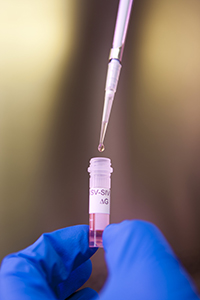August 2, 2018
IAVI and the Public Health Agency of Canada Enter into License Agreement for Technology to Enable Lassa Fever Vaccine Development
IAVI to apply expertise in viral vector vaccines to Lassa Fever prevention effort.
 Photo credit: Charlotte Raymond Photography
Photo credit: Charlotte Raymond Photography
NEW YORK – AUGUST 02, 2018 – The International AIDS Vaccine Initiative (IAVI) today announced that it has entered into a non-exclusive license agreement with the Public Health Agency of Canada (PHAC) toward advancing development, regulatory approval, and supply of a new vaccine candidate against Lassa fever virus, an ongoing public health threat in West Africa.
Through this agreement, IAVI obtained technology for a recombinant vesicular stomatitis virus (VSV) Lassa fever vaccine candidate, rVSV∆G-LASV-GPC. Developed by scientists at the PHAC’s National Microbiology Laboratory and based on the same platform used to produce Merck’s successful Ebola Zaire virus vaccine, this candidate provided high-level protection from Lassa fever virus in previously conducted animal studies.
With support from the Coalition for Epidemic Preparedness Innovations, the IAVI-led Lassa fever vaccine development program will further develop this candidate and create a stockpile to address future outbreaks. An estimated 100,000 to 300,000 Lassa fever cases are diagnosed annually, resulting in approximately 5,000 deaths. The World Health Organization (WHO) has identified Lassa fever as one of the top emerging pathogens likely to cause severe outbreaks in the near future.
In addition to its core HIV vaccine effort, IAVI seeks to maximize its impact on global public health by working with partners to address other urgent unmet public health needs – including vaccines for other infectious diseases – where its technologies and experience in vaccine and monoclonal antibody discovery and development can add unique value.
“IAVI looks forward to continuing the innovative vaccine science pioneered by PHAC scientists. We are excited to apply more than a decade of our experience in viral vector vaccines to advance the development of this Lassa fever vaccine candidate,” said Mark Feinberg, M.D., Ph.D., president and CEO of IAVI. “By continuing to evolve our understanding of and expertise with the VSV platform, which we are also using for HIV vaccine development efforts, we believe we will enhance our ability to develop and deliver an effective HIV vaccine to those who need it most.”
“It’s great to hear that the innovative work of our scientists at the National Microbiology Laboratory will contribute to new options for the treatment of Lassa fever,” said Dr. Theresa Tam, Chief Public Health Officer of Canada.
# # #
About Lassa Fever
Lassa fever is an emerging zoonotic virus that causes severe hemorrhagic fever in humans. An estimated 100,000 to 300,000 Lassa fever cases are diagnosed annually, resulting in approximately 5,000 deaths. Despite this high morbidity and mortality, no vaccine for Lassa fever is currently available.
Lassa fever is endemic to West Africa and is associated with annual outbreaks as evidenced by the ongoing outbreak in Nigeria which started in January 2018. In addition to its toll in affected countries in Africa, Lassa fever has the potential to spread more widely if infected individuals travel and become ill outside the endemic region. The WHO has identified Lassa fever as one of the top emerging pathogens likely to cause severe outbreaks in the near future in its recently created Research and Development Blueprint for Action to Prevent Epidemics.
The Lassa virus is most commonly transmitted to humans from an infected rodent known as the multimammate rat. However, the virus can also spread from person to person via bodily fluids and causes a range of symptoms including vomiting, swelling of the face, bleeding, and pain in the chest, back, and abdomen.
About the rVSV∆G-LASV-GPC Vaccine
This vaccine is based on an attenuated strain of vesicular stomatitis virus that has been modified to express a Lassa fever virus protein that plays an essential role in establishing virus infection. The rVSV∆G-LASV-GPC vaccine was created by scientists at the Public Health Agency of Canada’s National Microbiology Laboratory.
About the Public Health Agency of Canada
The Public Health Agency of Canada empowers Canadians to improve their health. In partnership with others, its activities focus on preventing disease and injuries, promoting good physical and mental health, and providing information to support informed decision making. It values scientific excellence and provides national leadership in response to public health threats.